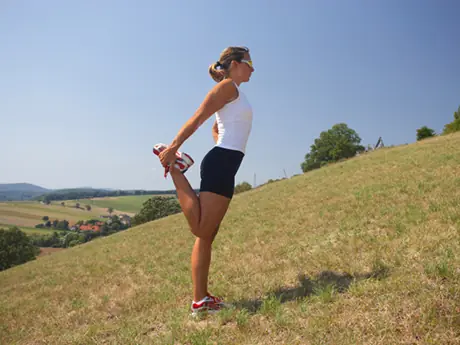
If I asked you if you practiced yoga, your response would probably be something like "I already swim, bike, and run, what more do you want from me?" or perhaps, "I've heard it can be helpful, but I don't have time for a fourth discipline."
But what if I told you that yoga can actually make you stronger and more balanced? What if I told you that yoga can actually save you time?
Create Balance as a Goal
There are many benefits yoga can offer a triathlete—from injury prevention to settling pre-race jitters. Above all, however, yoga will teach you to achieve a sense of balance: to be more in-tune with your body; to listen for early signs of aches and pains; to choose safety over competition; and to know when rest is important.
The demands of a triathlete's training schedule are indisputably intense. Learning when it's appropriate to rest is a challenge; after all, you don't want to be behind in your training when you have a big race on the horizon.
More: Why Every Athlete Should Practice Yoga
In reality, competitive triathletes often push their bodies too far. This overtraining can cause imbalances in the body, which is the number one cause for injury. And it's no secret that triathletes tend to get an array of injuries.
That's where yoga can actually save you time. Injuries are time consuming. They take you away from your sport and keep you off the road and out of the water. They threaten your race participation and your chance to PR. No one understands this better than the athlete with a knee injury trying to juggle the doctor's visit, physical therapy appointment, and time in the pool to make up for lost time on the road.
Knowing that imbalances in the body are the biggest cause of injury, you should put some effort into balancing your body. And I'm not talking about standing on your head or on one foot. Yoga can help your body find its way back to proper alignment.
With a small commitment to yoga, you can increase your flexibility, strength, focus and, most importantly, your balance. There are many ways in which creating balance in your every day, as well as in your training, can help you as an athlete.
More: How to Create a Balanced Life
Balance in the Body
Overuse injuries are the most common manifestation of imbalance in triathletes. When muscles and structures are imbalanced, they overcompensate with other body parts, creating imbalances in the body, which can ultimately lead to a wide range of injuries.
Some common injuries and problem areas in triathletes include:
- Knees
- IT Band
- Plantar Fasciitis
- Shoulder and rotator cuff
- Hips
- Hamstrings
- Low Back
- 1
- of
- 3
About the Author




Discuss This Article